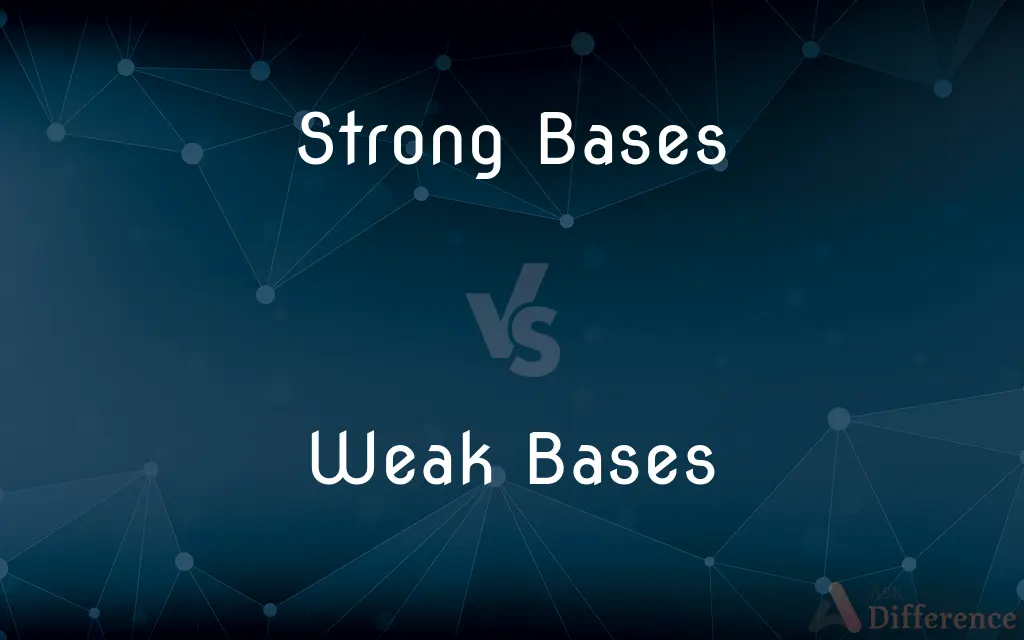Strong Bases vs. Weak Bases — What's the Difference?
By Tayyaba Rehman — Published on January 16, 2024
Strong bases fully dissociate in water, producing more OH- ions, while weak bases only partially dissociate, producing fewer OH- ions.

Difference Between Strong Bases and Weak Bases
Table of Contents
ADVERTISEMENT
Key Differences
Dissociation and Ion Production: Strong bases completely dissociate in water, releasing a large number of hydroxide ions (OH-). Weak bases partially dissociate, resulting in fewer hydroxide ions.
pH Levels and Strength: Strong bases raise the pH of a solution significantly due to complete ionization. Weak bases cause a smaller increase in pH due to partial ionization.
Conductivity and Reactions: Strong bases are better conductors of electricity in solution and react more vigorously with acids. Weak bases have lower conductivity and react less vigorously.
Examples and Common Uses: Sodium hydroxide (NaOH) is a common strong base used in industry, while ammonia (NH3) is a typical weak base used in cleaning agents.
Acid-Base Titration: In titrations, strong bases reach the endpoint more abruptly, whereas weak bases show a more gradual change in pH.
ADVERTISEMENT
Comparison Chart
Dissociation in Water
Fully dissociate
Partially dissociate
Hydroxide Ion Production
High amount of OH- ions
Fewer OH- ions
PH Level Impact
Cause a significant increase in pH
Cause a smaller increase in pH
Conductivity and Reaction
Higher conductivity, vigorous reaction
Lower conductivity, less vigorous reaction
Examples
Sodium hydroxide (NaOH), Potassium hydroxide (KOH)
Ammonia (NH3), Methylamine (CH3NH2)
Compare with Definitions
Strong Bases
High Conductivity: Conducts electricity well in aqueous solutions.
Strong bases like lithium hydroxide are used in CO2 scrubbers.
Weak Bases
Partial Dissociation: Substances that don't fully dissociate in water.
Ammonia, a weak base, is used in household cleaners.
Strong Bases
Complete Dissociation: Substances that fully dissociate in water.
Sodium hydroxide is a strong base used in soap making.
Weak Bases
Lower Conductivity: Conducts electricity poorly in solution.
Pyridine, a weak base, is used as a solvent in laboratories.
Strong Bases
Reactive with Acids: Reacts completely with acids in neutralization reactions.
Calcium hydroxide, a strong base, is used to neutralize acidic soil.
Weak Bases
Moderate pH Contributor: Causes a moderate increase in pH.
Methylamine, a weak base, is used in the production of dyes.
Strong Bases
Industrial Use: Commonly used in industrial processes.
Barium hydroxide, a strong base, is used in the purification of sugars.
Weak Bases
Partial Acid Reaction: Does not completely neutralize acids.
Urea, a weak base, is used in fertilizers and cosmetics.
Strong Bases
High pH Contributor: Increases the pH of solutions significantly.
Potassium hydroxide, a strong base, is used in alkaline batteries.
Weak Bases
Biological Relevance: Found in many biological systems.
Adenine, a weak base, is a component of DNA.
Common Curiosities
Do strong bases have a high pH?
Yes, strong bases result in a high pH.
What defines a weak base?
A base that partially dissociates in water.
What defines a strong base?
A base that fully dissociates in water.
Do weak bases always have a low pH?
Not necessarily low, but weaker bases have a moderately high pH.
Can strong bases be used in household products?
Yes, but they're usually diluted due to their high reactivity.
What's an example of a strong base in industry?
Sodium hydroxide in paper manufacturing.
What's an example of a weak base in daily life?
Ammonia in cleaning products.
Are strong bases used in food processing?
They can be, but typically in very controlled conditions.
How do strong bases affect acid-base titrations?
They cause a sharp change in pH at the endpoint.
How are weak bases important in biology?
Many biological processes involve weak bases, like DNA replication.
Are weak bases safer to handle than strong bases?
Generally, yes, due to their lower reactivity and concentration.
Are all strong bases corrosive?
Most strong bases are corrosive, especially in high concentrations.
Can weak bases neutralize strong acids?
Yes, but the reaction is less complete compared to strong bases.
Is the strength of a base related to its concentration?
Strength is a measure of dissociation, not concentration.
Can the strength of a base change in different conditions?
The strength is generally consistent, but effectiveness can vary with concentration and temperature.
Share Your Discovery

Previous Comparison
Local Anesthesia vs. General Anesthesia
Next Comparison
AKA vs. DSTAuthor Spotlight
Written by
Tayyaba RehmanTayyaba Rehman is a distinguished writer, currently serving as a primary contributor to askdifference.com. As a researcher in semantics and etymology, Tayyaba's passion for the complexity of languages and their distinctions has found a perfect home on the platform. Tayyaba delves into the intricacies of language, distinguishing between commonly confused words and phrases, thereby providing clarity for readers worldwide.
















































